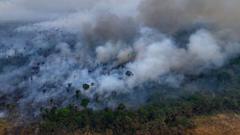The world’s tropical forests, essential in the fight against climate change, experienced unprecedented loss last year, with satellite analysis revealing a staggering 67,000 square kilometers (around 26,000 square miles) vanished in 2024. This destruction, equivalent to nearly the size of the Republic of Ireland or 18 football fields every minute, was primarily driven by fires, which overtook agricultural land clearances for the first time in recorded history. The Amazon rainforest suffered severely from this loss, especially amid its worst drought in recorded history.
While the data paints a dire picture globally, there are glimmers of hope in regions like Southeast Asia, where effective government policies have resulted in reduced forest loss. Countries such as Indonesia have reported an 11% decrease in primary forest loss compared to the previous year due to stringent "no burning" laws, representing a successful model for forest management.
The implications of the global forest loss are significant. Tropical rainforests play a critical role in storing carbon, with their devastation releasing an estimated 3.1 billion tonnes of CO2 into the atmosphere—equivalent to the total emissions of the European Union. Researchers warn that we may be approaching a "tipping point," particularly for the Amazon rainforest, which, if global temperatures exceed 1.5°C, could see substantial dieback. Such a shift would not only threaten biodiversity but also potentially transform functioning ecosystems into savannas.
Prof. Matthew Hansen from the University of Maryland's GLAD laboratory expressed concern, suggesting that the escalation in forest fires is influenced by climate change, increasing the intensity and frequency of such events. Rod Taylor from the World Resources Institute echoed this sentiment, stating that the interplay between drought conditions and fires represents a feedback loop that compounds the challenges of deforestation.
The upcoming UN climate summit, COP30, hosted in the Amazon, is seen as crucial for advancing forest protection strategies. Experts highlight the necessity of sustained political will in reducing forest loss, noting that nations like Brazil experienced setbacks due to policy shifts in the past. Proposals for financial incentives to countries that maintain their forests could pave the way for innovative conservation solutions.
While the situation remains alarming, the success stories in Southeast Asia offer a roadmap for what can be achieved through dedicated efforts in forest management, highlighting the need for ongoing commitment and action to curb the rapid degradation of the planet’s vital ecosystems.
While the data paints a dire picture globally, there are glimmers of hope in regions like Southeast Asia, where effective government policies have resulted in reduced forest loss. Countries such as Indonesia have reported an 11% decrease in primary forest loss compared to the previous year due to stringent "no burning" laws, representing a successful model for forest management.
The implications of the global forest loss are significant. Tropical rainforests play a critical role in storing carbon, with their devastation releasing an estimated 3.1 billion tonnes of CO2 into the atmosphere—equivalent to the total emissions of the European Union. Researchers warn that we may be approaching a "tipping point," particularly for the Amazon rainforest, which, if global temperatures exceed 1.5°C, could see substantial dieback. Such a shift would not only threaten biodiversity but also potentially transform functioning ecosystems into savannas.
Prof. Matthew Hansen from the University of Maryland's GLAD laboratory expressed concern, suggesting that the escalation in forest fires is influenced by climate change, increasing the intensity and frequency of such events. Rod Taylor from the World Resources Institute echoed this sentiment, stating that the interplay between drought conditions and fires represents a feedback loop that compounds the challenges of deforestation.
The upcoming UN climate summit, COP30, hosted in the Amazon, is seen as crucial for advancing forest protection strategies. Experts highlight the necessity of sustained political will in reducing forest loss, noting that nations like Brazil experienced setbacks due to policy shifts in the past. Proposals for financial incentives to countries that maintain their forests could pave the way for innovative conservation solutions.
While the situation remains alarming, the success stories in Southeast Asia offer a roadmap for what can be achieved through dedicated efforts in forest management, highlighting the need for ongoing commitment and action to curb the rapid degradation of the planet’s vital ecosystems.


















